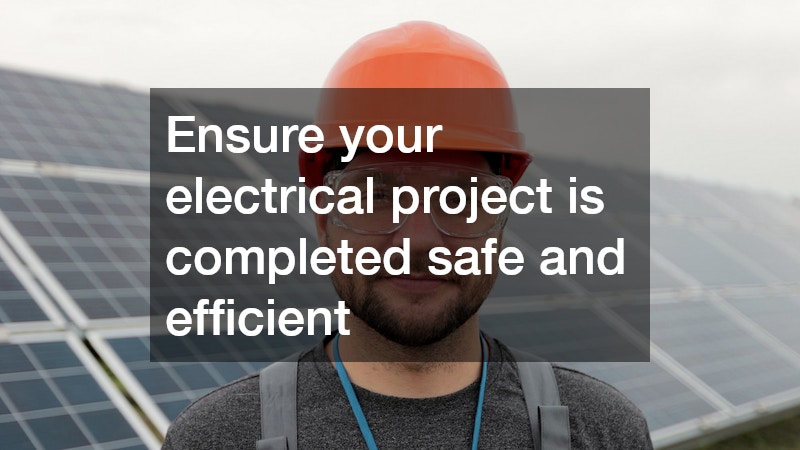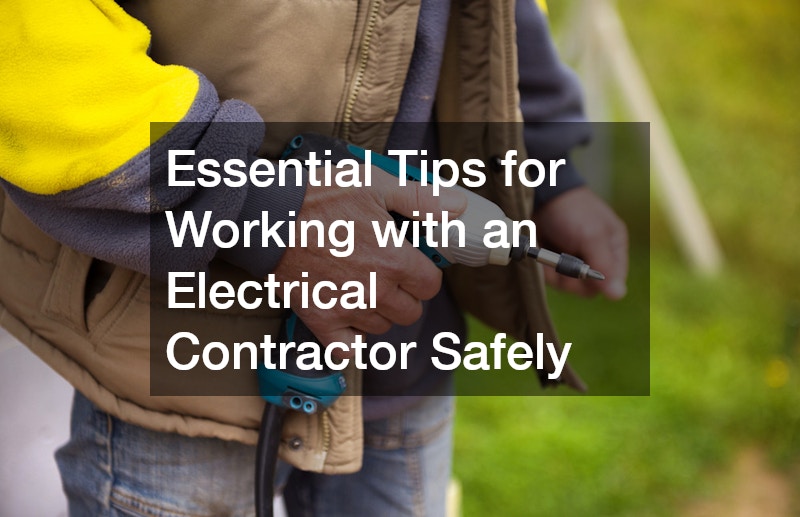Navigating electrical projects can be daunting if you’re not familiar with the intricacies involved. Whether you’re installing new lighting fixtures or need complete wiring for your new property, hiring a professional is usually the safest route to ensure quality work. Therefore, working with an electrical contractor not only enhances safety but also guarantees code compliance in every project. Here are some essential tips to consider when working with a contractor to safeguard yourself and your property.
Understanding Your Project
Before approaching an electrical contractor, it’s crucial to have a basic understanding of your project. By knowing what you need, you can communicate more effectively with the contractor, ensuring that they understand your vision and requirements. This preliminary research on your part will also allow you to gauge the contractor’s knowledge and expertise accurately. For instance, understanding whether you need a repair or a full-scale installation can guide your discussions towards relevant processes and budgets. Furthermore, this prepares you to ask the right questions about materials, timelines, and safety measures while discussing with your electrical expert.
Understanding the project’s scope also requires you to know your budget constraints and timelines. Contractors often provide cost estimates and project timelines based on their experience and the complexity of the task. Make sure you discuss your budget realistically and ask for breakdowns if necessary, so there are no surprises later on. Clear expectations on both ends lead to smoother project execution and a better working relationship. The goal is to ensure the project is completed on time, within budget, and with the highest safety standards.
Researching and Checking Credentials
One of the most critical steps in ensuring safety while working with an electrical contractor is thorough research and credential checking. Start by checking if the contractor holds a valid license to operate in your area, as licensing laws vary by state and locality. A licensed electrical professional is not only a sign of professional competence but also provides legal protection. Moreover, check if the contractor is insured and bonded, which further secures you against potential liabilities and financial losses. An insured contractor protects both their workers and you, should any accidents occur on the job.
Beyond licenses, consider the contractor’s reputation and reliability. You can assess this by looking at customer reviews, testimonials, and ratings on various platforms. Satisfied customers often indicate a reliable contractor who provides safe and quality service. Contacting previous clients directly can also give you invaluable insights into the contractor’s work ethic and punctuality. This real-world validation is a more trustworthy indicator than any marketing materials you might encounter.
Certifications are another critical factor to evaluate, especially for specialized electrical work. Specialized certifications show that the contractor stays up-to-date with the latest technology, methodologies, and safety standards in the field. Regulatory organizations and professional bodies often award these certifications, emphasizing the contractor’s commitment to safe and quality construction practices. Don’t hesitate to ask for proof of any claims the contractor makes regarding additional training or certifications. Holding your electrical contractor to high standards protects you from subpar work and ensures a safer work environment.
Ensuring Clear Communication
Effective communication is essential when working with an electrical contractor. Setting clear expectations at the outset will help prevent misunderstandings and subsequent safety issues during the project. Start by discussing your needs, timelines, and any specific concerns you have regarding your electrical project. It’s advisable to outline everything in a formal contract, detailing each party’s responsibilities and expectations. Clear documentation helps prevent disputes and serves as a guideline for the contractor throughout the project.
Transparency should be a mutual practice, with contractors keeping you informed about project progress and any obstacles encountered. Regular updates allow for timely adjustments, keeping the project on track and enhancing overall safety. Encourage an open dialogue where questions are welcomed and feedback is shared openly. This transparency ensures that both you and the contractor remain aligned on objectives and practices. A contractor responsive to communication often signifies a commitment to quality and safety.
Besides verbal communication, ensure you have access to technical documentation and plans where necessary. Blueprints, wiring diagrams, and safety protocols should be readily available for review. This documentation aids in tracking the completion of each phase and provides clarity if adjustments are necessary. Additionally, having a written record prevents reliance on memory, reducing the risk of errors in safety-critical processes. Ensure that the electrical contractor maintains comprehensive records as the project progresses.
Prioritizing Safety Measures
Safety should always be a top priority when hiring an electrical contractor. Begin by ensuring the contractor adheres to all compulsory safety standards and practices as per industry regulations. For instance, ensuring that appropriate personal protective equipment (PPE) is used can significantly reduce the risk of injuries on-site. Inquiring about the safety protocols the contractor implements demonstrates your commitment to a secure working environment. These precautions are essential for preventing accidents and ensuring the health and well-being of everyone involved.
An important aspect of safety is understanding the risks and having an emergency plan. Discuss potential hazards and the contractor’s plan for emergency response before starting the project. Having clearly defined steps for risk management allows swift action to be taken in case of unforeseen events. This preparation can also include maintaining readily accessible contact information for emergency services. Clear contingency planning is vital in ensuring both the safety and continuous execution of the electrical project.
Working with an electrical contractor can be seamless and rewarding when approached thoughtfully and carefully. Understanding your project, researching your contractor’s credentials, ensuring clear communication, and prioritizing safety are crucial steps in this process. By following these guidelines, you can ensure your electrical project is completed safely, efficiently, and to your satisfaction. Professional help is invaluable, especially in complex undertakings involving electrical systems that demand expertise and precision. With the right partnership, you can not only enhance the safety of your projects but also achieve enduring results that reflect high-quality craftsmanship.


